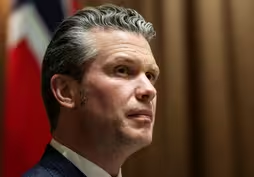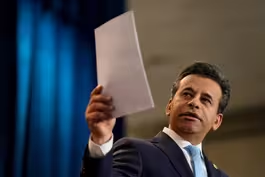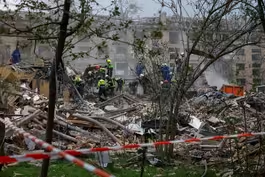
The benefits and toll of rebuilding U.S. aluminum industry
Clip: 4/24/2025 | 8m 35sVideo has Closed Captions
The benefits and financial toll of rebuilding America’s aluminum industry
The central economic focus of President Trump's second term so far has been tariffs. Over the past few months, the president has levied - and also paused - taxes on imports from all over the world. Some have taken effect, including his tariffs on aluminum. Economics correspondent Paul Solman looks at those and what kind of impact they may have on manufacturers, workers and consumers.
Problems playing video? | Closed Captioning Feedback
Problems playing video? | Closed Captioning Feedback
Major corporate funding for the PBS News Hour is provided by BDO, BNSF, Consumer Cellular, American Cruise Lines, and Raymond James. Funding for the PBS NewsHour Weekend is provided by...

The benefits and toll of rebuilding U.S. aluminum industry
Clip: 4/24/2025 | 8m 35sVideo has Closed Captions
The central economic focus of President Trump's second term so far has been tariffs. Over the past few months, the president has levied - and also paused - taxes on imports from all over the world. Some have taken effect, including his tariffs on aluminum. Economics correspondent Paul Solman looks at those and what kind of impact they may have on manufacturers, workers and consumers.
Problems playing video? | Closed Captioning Feedback
How to Watch PBS News Hour
PBS News Hour is available to stream on pbs.org and the free PBS App, available on iPhone, Apple TV, Android TV, Android smartphones, Amazon Fire TV, Amazon Fire Tablet, Roku, Samsung Smart TV, and Vizio.
Providing Support for PBS.org
Learn Moreabout PBS online sponsorshipGEOFF BENNETT: The central economic focus of President Trump's second term so far has been tariffs.
Over the past few months, the president has levied and also paused taxes on imports from all over the world.
Some have taken effect, including his tariffs on aluminum.
Economics correspondent Paul Solman looks at those and what kind of impact they might have on manufacturers, workers and consumers.
CHARLES JOHNSON, The Aluminum Association: Aluminum is a magic metal, and it's all around you.
Your telephone is made of aluminum.
Your refrigerator is made of aluminum.
Life as we know it wouldn't exist without it.
PAUL SOLMAN: That's Charles Johnson of the Aluminum Association.
Problem is, we import much of the aluminum we use and that's the rationale for bringing it all back home.
CHARLES JOHNSON: We absolutely support the president's stated objectives of building and growing American manufacturing and reshoring segments of manufacturing that has left our country previously.
And that would include smelters.
PAUL SOLMAN: Aluminum smelters, says Charles Johnson, speaking for the industry.
We had nearly 30 of them a few decades ago.
America's now down to just four.
One way to try to boost those numbers, tariffs.
In March, President Trump slapped a 25 percent tariff on all aluminum imports to the U.S., no exceptions, not even for cans.
DONALD TRUMP, President of the United States: We're going to take back our wealth and we're going to take back -- a lot of the companies that left are coming back.
PAUL SOLMAN: Companies like those in the aluminum industry trying to preserve and even hopefully expand their profits and jobs,and supposedly to protect our national security, because aluminum isn't only used in ladders and siding.
CHARLES JOHNSON: It's also used in the planes and tanks and other defense products that keep our country safe.
And the defense of our country certainly wouldn't exist in its current form without aluminum.
PAUL SOLMAN: Yes, echoes Scott Paul.
SCOTT PAUL, President, Alliance for American Manufacturing: This is a medal that's important to our national security.
PAUL SOLMAN: Scott Paul runs the Alliance for American Manufacturing, which includes aluminum.
SCOTT PAUL: There are only a handful of makers of weapons-grade or military-grade aluminum in the United States.
And to be that dependent on foreign sources puts us in a risky position.
PAUL SOLMAN: Foreign sources selling at prices driven down by China, he says, which illegally undercut the world market, making aluminum so cheap that U.S. firms can't compete.
SCOTT PAUL: When these Chinese firms, many of which are either owned or heavily subsidized by the Chinese government, came onto the world stage, it dropped the price to impossibly low levels.
It's not because our producers here aren't innovative or our workers aren't efficient.
It's because there is not a level playing field and we have been besieged by the unfair trade practices of China in particular.
PAUL SOLMAN: Unfair trade practices like government subsidies, plus exploiting cheap labor and ignoring the environment.
OK, my job is not just to lay out these arguments, but also hear the objections to them.
So, first, manufacturing jobs.
WENDY EDELBERG, Brookings Institution: It stands for reason that tariffs on aluminum will expand the aluminum sector.
And that might indeed lead to some degree of more employment in the aluminum sector, although that sector is not particularly labor-intensive.
PAUL SOLMAN: Wendy Edelberg, former chief economist at the Congressional Budget Office.
WENDY EDELBERG: But those tariffs will most assuredly raise prices of the manufactured goods that we try to sell.
PAUL SOLMAN: Because there's so much aluminum in so many domestic products and higher prices usually mean lower sales.
WENDY EDELBERG: And that in turn will actually reduce employment in manufacturing.
PAUL SOLMAN: And so the skepticism.
Here's another,the cost of producing more aluminum here at home.
WILLY SHIH, Harvard Business School: The challenge about aluminum... PAUL SOLMAN: Professor Willy Shih... WILLY SHIH: ... is, it has a tremendous amount of energy content, electrical energy.
PAUL SOLMAN: And electricity is far more expensive in the U.S. than in hydroelectric-heavy Canada, say, from which we buy more than half of all our imported aluminum.
In 2018, Trump imposed aluminum tariffs to right the trade imbalance.
CHARLES JOHNSON: The original intent of the tariffs that President Trump put in place in his first administration was to get more smelters in the United States, and that has not been the case.
Tariffs alone won't produce smelters in the United States.
PAUL SOLMAN: And with massive A.I.
data centers going up all over the country, straining our energy resources already and driving up demand, says Charles Johnson, more than ever, the industry needs electricity that's cheap and, crucially, dependably cheap.
CHARLES JOHNSON: Energy at the right price, but also the surety that you're going to get that energy at that price for 20 to 30 years into the future.
There are multiple paths forward for a government that wants to support this type of expansion, tax incentives, for instance, and others.
PAUL SOLMAN: Including U.S. government subsidies, if necessary, he says.
And Scott Paul agrees.
SCOTT PAUL: We do have to invest in a smarter, more modern grid, but we have the capacity to do this in the United States.
PAUL SOLMAN: But, ask tariff skeptics, given budget constraints, will we actually pay to subsidize low energy prices for the aluminum industry, given that, as you have heard, a major complaint of tariff supporters is about Chinese government subsidies?
OK, but what about the national security argument?
Don't we need to cushion ourselves against other countries suddenly choking off our aluminum supply?
WENDY EDELBERG: If the president's right that we need to support our aluminum sector for national security reasons, then it makes sense that we should, in turn, decide to pay more, pay higher prices, support that industry.
And that is all in service of national security.
PAUL SOLMAN: Again, Wendy Edelberg.
WENDY EDELBERG: What I worry is that national security is just a pretense, and then something's wrong.
PAUL SOLMAN: Yes, but even if it is a pretense, don't we need a resilient supply?
WILLY SHIH: If I need domestic production for resilience, either I need my energy costs to be lower or I need to be willing to pay more.
In other words, the price of resilience is, it costs me more.
People always talk about resilience, but they don't want to pay for it.
PAUL SOLMAN: And there's a final constituency that may find tariffs unappealing, American consumers, who figure to be paying more for products that contain a lot of aluminum, whether made here or abroad.
How much more?
GLENN STEVENS JR., Executive Director, MichAuto: Between $3,000 and up to $10,000 on a higher transaction price vehicle could be the increase that a consumer would be looking at.
PAUL SOLMAN: Glenn Stevens Jr. of MichAuto, a car industry trade group in Detroit.
GLENN STEVENS JR.: And the question is, what does it do to overall demand?
Consumer sentiment has taken a hit recently.
Our concern, and we're hearing this from dealers in the showrooms already, is that traffic has declined.
PAUL SOLMAN: Indeed, this may just have become President Trump's concern as well.
It's now being reported that he may exempt imported parts for U.S. automakers, including parts made of aluminum.
No such accommodation for the construction industry, though, at least not yet.
Los Angeles construction contractor Cheryl Osborn.
CHERYL OSBORN, President and Founder, Casco Contractors: Everyone's afraid.
I mean, we hate to use the R-word, but everyone's afraid that there's going to be a contraction of demand for construction.
PAUL SOLMAN: To Wendy Edelberg, the key word is the uncertainty introduced by President Trump's policy terms.
WENDY EDELBERG: I worry that what he's actually doing with tariff policy more broadly is just creating debilitating uncertainty for our industries.
If you look at survey evidence of what industries are saying about their plans for capital expenditures, for example, those plans have become way more pessimistic over the last months.
I worry that the damage on investments already been done.
PAUL SOLMAN: Contractor Osborn?
CHERYL OSBORN: I would 100 percent second that.
That's the word that everyone's using.
"Just the uncertainty is what I don't know, Cheryl."
When COVID happened, for example, people were so unsure and they just completely stopped building.
Same thing happened after 9/11.
I saw people just pull the plug on projects very quickly.
PAUL SOLMAN: Uncertainty in the aluminum sector and plenty of others for the unforeseeable future.
For the "PBS News Hour," Paul Solman.
Harvard scientist describes ICE detention, deportation fears
Video has Closed Captions
Clip: 4/24/2025 | 7m 12s | Russian-born Harvard researcher describes detention at ICE facility and deportation fears (7m 12s)
Hegseth has unsecured internet in Pentagon office for Signal
Video has Closed Captions
Clip: 4/24/2025 | 4m 37s | Hegseth reportedly has unsecured internet line in Pentagon office for Signal (4m 37s)
How lawmakers are responding to frustrated constituents
Video has Closed Captions
Clip: 4/24/2025 | 5m 18s | How lawmakers are responding to frustrated constituents at town halls (5m 18s)
New FDA commissioner on abortion medication restrictions
Video has Closed Captions
Clip: 4/24/2025 | 2m 1s | What the new FDA commissioner says about possible restrictions on abortion medication (2m 1s)
Religious directives complicate care at Catholic hospitals
Video has Closed Captions
Clip: 4/24/2025 | 9m 11s | Religious directives at Catholic hospitals complicate emergency care for pregnant women (9m 11s)
Russian attacks on Kyiv complicate U.S. peace talks
Video has Closed Captions
Clip: 4/24/2025 | 3m 13s | Russian attacks on Kyiv complicate U.S. efforts to end war in Ukraine (3m 13s)
Utility assistance frozen after Trump fires program's staff
Video has Closed Captions
Clip: 4/24/2025 | 5m 8s | Utility assistance frozen after Trump administration fires program's staff (5m 8s)
Providing Support for PBS.org
Learn Moreabout PBS online sponsorship
- News and Public Affairs

FRONTLINE is investigative journalism that questions, explains and changes our world.

- News and Public Affairs

Amanpour and Company features conversations with leaders and decision makers.












Support for PBS provided by:
Major corporate funding for the PBS News Hour is provided by BDO, BNSF, Consumer Cellular, American Cruise Lines, and Raymond James. Funding for the PBS NewsHour Weekend is provided by...






